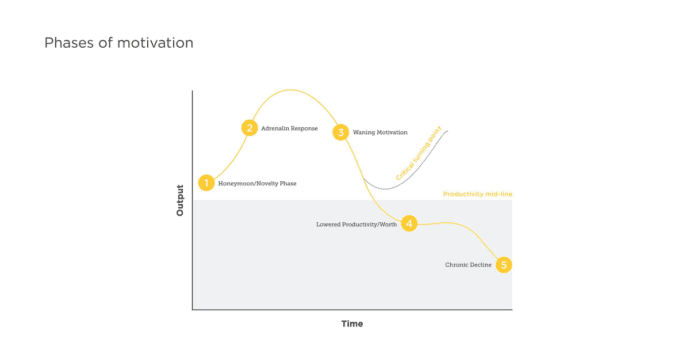Motivation is a somewhat mysterious force – one that can work in our favour, fuelling innovation and creativity, or in times where it’s challenged it can hinder our results and even completely stop us in our tracks.
Through the shift to remote work you may notice the motivation levels of your team members dropping. If left unchecked, this can lead to uncompleted tasks piling up and deadlines being missed completely.
Today we’re going to take a look at a few steps you can take when you begin to notice a lack of motivation impacting performance. We’ll also dig into a couple of the signs of waning motivation to look out for in your people so you can get ahead of the issue before it heads into a downward spiral.
Signs of waning motivation to look out for:
- Reduced contribution in team meetings
- BAU tasks are taking longer to complete
- Project deadlines are being missed
- Communication with team members has dropped off
How to address a lack of motivation when it impacts performance:
Step #1: Be objective
Firstly, is your perception of the impact on performance accurate? Human beings have a vast array of cognitive biases that can affect our perception significantly, and unless we have clear objective measures around performance that indicate underperformance, we can be led astray by our biases. Reflect and consider what you’re measuring performance against before taking the next step.
Step #2: Be specific
If you have clear indicators of work not being achieved or standards not being met, then take a moment to pull this information together to paint a picture of the situation. Is there a particular area of work that the individual is struggling with? Could it be a specific project component or key stakeholder relationship that isn’t being met that is resulting in underperformance? Is there a newness or overexposure to a task that is leading to lowered levels of motivation? By taking some time to get forensic, you’ll be able to define the areas of concern and communicate them clearly in ensuing conversations. This will lead to a more beneficial conversation; one that can lead to effective behaviour change.
Step #3: Be clear
If underperformance has indeed presented itself, then clearly outlining or defining this as being unacceptable is critically important. Equally, your complete conviction to support and assist the individual to remedy the current situation is something you should clearly outline too. Especially in cases of lowered motivation levels, coming to the situation with a coaching approach will allow you to have a more meaningful conversation that will help the individual get back on track.
Step #4: Be practical
Rather than get into semantics around what good performance looks like, help strategise and time allocate small, important tasks in the early days to help momentum get established. Mapping out the first two weeks is much more important than talking about yearly goals or KPIs.
A useful coaching question to ask during the conversation is “How can I help you take your next best step?”. A significant way to re-establish progress (one of our best motivators) and increase someone’s self-worth (boosting morale) is to simply to help them focus on a few micro tasks to help get some wins on the board.
Step #5: Be accountable
This isn’t just for them, it’s for you too. If you’re walking away from a performance conversation without having a few items to deliver on yourself, then you’re missing an opportunity and lessening the chances of success. Lock in check-in dates to connect and discuss progress. Commit to sending them something to read or explore to assist with any roadblocks they’re facing. Take action and create mutual accountability.
Where is your team sitting on the motivation curve?

At the beginning of the year we shared this graphic to illustrate the different stages of motivation that people are likely to go through during the shift to remote work. Take a moment to consider where your team is sitting on the curve – have they been oscillating between two different stages over the last few months?
If you’re curious to know more about the science of motivation and would like to equip your leaders with the skills to manage the inevitable challenges, contact us and ask for some information on our new Masterclass Series.


